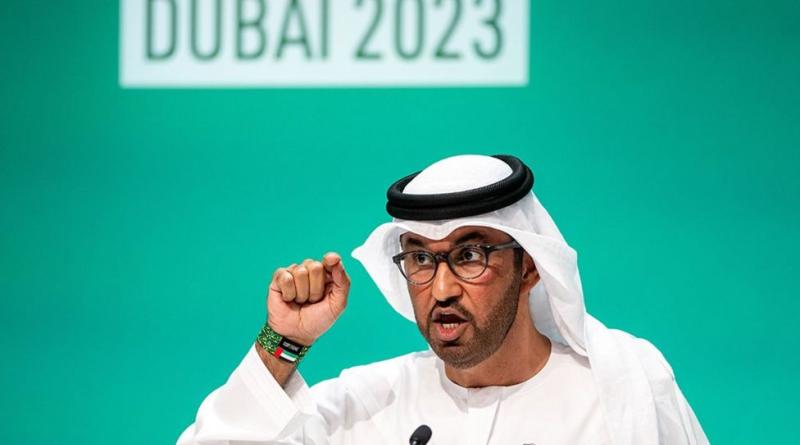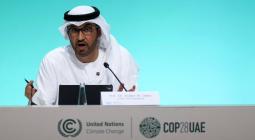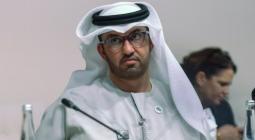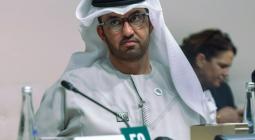COP28: Head of UN talks hits back at climate denial claims

The president of the ongoing UN climate talks Sultan al-Jaber has hit back at claims that he denies a core part of climate science.
It follows his earlier comments that there was "no science" behind requiring the end of fossil fuels in order to limit temperature rise to 1.5C.
"We very much believe and respect the science," he said on Monday.
The COP28 summit in Dubai, United Arab Emirates, aims to make progress on tackling climate change.
All countries at the UN climate talks in 2015 agreed to slash releases of warming gases in order to keep the average global temperature rise below 1.5C compared to pre-industrial levels.
But in an online event on 21 November with Mary Robinson, the chair of the Elders group and a former UN special envoy for climate change, Mr Jaber appeared to deny that.
"There is no science out there, or no scenario out there, that says that the phase-out of fossil fuel is what's going to achieve 1.5C," he said.
On Monday, the fifth day of the UN talks, Mr Jaber said "let me clarify where I stand on the science".
"I honestly think there is some confusion out there, and misrepresentation. I am quite surprised with the constant and repeated attempts to undermine the work of the COP28 presidency," he said.
At times he appeared irritated. "Science has been central to my own career progress and yes, I respect the science in everything I do," he added.
Mr Jaber, 50, trained as an engineer and economist.
"I have said over and over that the phase down and the phase out of fossil fuel is inevitable," he added, in one of his strongest statements yet about the future of oil, coal and gas.
He spoke on Monday sitting next to Professor Jim Skea, chair of the Intergovernmental Panel on Climate Change (IPCC).
"I can say Dr Sultan has been attentive to the science," Prof Skea said.
He said he wanted to make it clear that he was representing the global scientific consensus, signed off by governments.
He added he wanted to repeat what the IPCC says about fossil fuels.
"I will say it very precisely. Looking at scenarios in which global warming is limited to 1.5 degrees with no or little overshoot, by 2050, fossil fuel use is greatly reduced, and unabated coal use is completely phased out," he said.
To meet that goal, oil use had to be reduced by 60% and gas use by 45% by 2050, he said.
The UN talks are dominated by the question of how and when the use of oil, coal and gas will be reduced.
Countries whose economies rely heavily on fossil fuels are reluctant to agree to a complete end to the use of oil, coal, and gas.
Instead some suggest that expensive technologies that capture the warming gas carbon dioxide can be used, meaning the world can still burn fossil fuels at a significant rate.
But countries on the frontline of climate change want much stronger commitments to the full phase out of fossil fuels.
The UAE's presidency of the COP28 talks has attracted criticism because the country is one the top 10 oil and gas producers in the world. Mr Jaber also heads the giant Abu Dhabi National Oil Company (Adnoc).
On Monday morning Tina Stege, climate envoy for the Marshall Islands, made comments on behalf of nations vulnerable to climate change.
"The president has said that 1.5C is his North Star. We are here to hold him to that," she said.
Mr Jaber also referred to suggestions that he had been ill-tempered with Ms Robinson, the host of the November event.
"I had a conversation with someone I have a great deal of respect for," he said.






